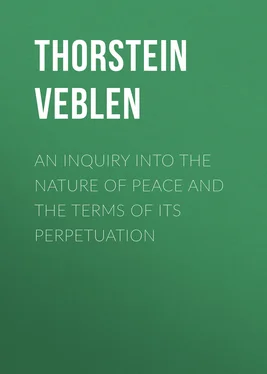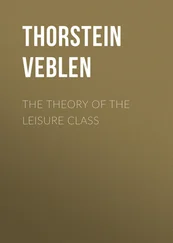Thorstein Veblen - An Inquiry into the Nature of Peace and the Terms of Its Perpetuation
Здесь есть возможность читать онлайн «Thorstein Veblen - An Inquiry into the Nature of Peace and the Terms of Its Perpetuation» — ознакомительный отрывок электронной книги совершенно бесплатно, а после прочтения отрывка купить полную версию. В некоторых случаях можно слушать аудио, скачать через торрент в формате fb2 и присутствует краткое содержание. Жанр: foreign_antique, Политика, Юриспруденция, foreign_edu, на английском языке. Описание произведения, (предисловие) а так же отзывы посетителей доступны на портале библиотеки ЛибКат.
- Название:An Inquiry into the Nature of Peace and the Terms of Its Perpetuation
- Автор:
- Жанр:
- Год:неизвестен
- ISBN:нет данных
- Рейтинг книги:5 / 5. Голосов: 1
-
Избранное:Добавить в избранное
- Отзывы:
-
Ваша оценка:
- 100
- 1
- 2
- 3
- 4
- 5
An Inquiry into the Nature of Peace and the Terms of Its Perpetuation: краткое содержание, описание и аннотация
Предлагаем к чтению аннотацию, описание, краткое содержание или предисловие (зависит от того, что написал сам автор книги «An Inquiry into the Nature of Peace and the Terms of Its Perpetuation»). Если вы не нашли необходимую информацию о книге — напишите в комментариях, мы постараемся отыскать её.
An Inquiry into the Nature of Peace and the Terms of Its Perpetuation — читать онлайн ознакомительный отрывок
Ниже представлен текст книги, разбитый по страницам. Система сохранения места последней прочитанной страницы, позволяет с удобством читать онлайн бесплатно книгу «An Inquiry into the Nature of Peace and the Terms of Its Perpetuation», без необходимости каждый раз заново искать на чём Вы остановились. Поставьте закладку, и сможете в любой момент перейти на страницу, на которой закончили чтение.
Интервал:
Закладка:
In all this there is nothing of a self-seeking or covetous kind. The common man who so lends himself to the aggressive enhancement of the national Culture and its prestige has nothing of a material kind to gain from the increase of renown that so comes to his sovereign, his language, his countrymen's art or science, his dietary, or his God. There are no sordid motives in all this. These spiritual assets of self-complacency are, indeed, to be rated as grounds of high-minded patriotism without afterthought. These aspirations and enthusiasms would perhaps be rated as Quixotic by men whose horizon is bounded by the main chance; but they make up that substance of things hoped for that inflates those headlong patriotic animosities that stir universal admiration.
So also, men find an invidious distinction in such matters of physical magnitude as their country's area, the number of its population, the size of its cities, the extent of its natural resources, its aggregate wealth and its wealth per capita, its merchant marine and its foreign trade. As a ground of invidious complacency these phenomena of physical magnitude and pecuniary traffic are no better and no worse than such immaterial assets as the majesty of the sovereign or the perfections of the language. They are matters in which the common man is concerned only by the accident of domicile, and his only connection with these things is an imaginary joint interest in their impressiveness. To these things he has contributed substantially nothing, and from them he derives no other merit or advantage than a patriotic inflation. He takes pride in these things in an invidious way, and there is no good reason why he should not; just as there is also no good reason why he should, apart from the fact that the common man is so constituted that he, mysteriously, takes pride in these things that concern him not.
Of the several groups or classes of persons within the political frontiers, whose particular interests run systematically at cross purposes with those of the community at large under modern conditions, the class of masters, rulers, authorities,—or whatever term may seem most suitable to designate that category of persons whose characteristic occupation is to give orders and command deference,—of the several orders and conditions of men these are, in point of substantial motive and interest, most patently at variance with all the rest, or with the fortunes of the common man. The class will include civil and military authorities and whatever nobility there is of a prescriptive and privileged kind. The substantial interest of these classes in the common welfare is of the same kind as the interest which a parasite has in the well-being of his host; a sufficiently substantial interest, no doubt, but there is in this relation nothing like a community of interest. Any gain on the part of the community at large will materially serve the needs of this group of personages, only in so far as it may afford them a larger volume or a wider scope for what has in latterday colloquial phrase been called "graft." These personages are, of course, not to be spoken of with disrespect or with the slightest inflection of discourtesy. They are all honorable men. Indeed they afford the conventional pattern of human dignity and meritorious achievement, and the "Fountain of Honor" is found among them. The point of the argument is only that their material or other self-regarding interests are of such a nature as to be furthered by the material wealth of the community, and more particularly by the increasing volume of the body politic; but only with the proviso that this material wealth and this increment of power must accrue without anything like a corresponding cost to this class. At the same time, since this class of the superiors is in some degree a specialised organ of prestige, so that their value, and therefore their tenure, both in the eyes of the community and in their own eyes, is in the main a "prestige value" and a tenure by prestige; and since the prestige that invests their persons is a shadow cast by the putative worth of the community at large, it follows that their particular interest in the joint prestige is peculiarly alert and insistent. But it follows also that these personages cannot of their own substance or of their own motion contribute to this collective prestige in the same proportion in which it is necessary for them to draw on it in support of their own prestige value. It would, in other words, be a patent absurdity to call on any of the current ruling classes, dynasties, nobility, military and diplomatic corps, in any of the nations of Europe, e.g., to preserve their current dignity and command the deference that is currently accorded them, by recourse to their own powers and expenditure of their own substance, without the usufruct of the commonalty whose organ of dignity they are. The current prestige value which they enjoy is beyond their unaided powers to create or maintain, without the usufruct of the community. Such an enterprise does not lie within the premises of the case.
In this bearing, therefore, the first concern with which these personages are necessarily occupied is the procurement and retention of a suitable usufruct in the material resources and good-will of a sufficiently large and industrious population. The requisite good-will in these premises is called loyalty, and its retention by the line of personages that so trade on prestige rests on a superinduced association of ideas, whereby the national honour comes to be confounded in popular apprehension with the prestige of these personages who have the keeping of it. But the potentates and the establishments, civil and military, on whom this prestige value rests will unavoidably come into invidious comparison with others of their kind; and, as invariably happens in matters of invidious comparison, the emulative needs of all the competitors for prestige are "indefinitely extensible," as the phrase of the economists has it. Each and several of them incontinently needs a further increment of prestige, and therefore also a further increment of the material assets in men and resources that are needful as ways and means to assert and augment the national honor.
It is true, the notion that their prestige value is in any degree conditioned by the material circumstances and the popular imagination of the underlying nation is distasteful to many of these vicars of the national honour. They will incline rather to the persuasion that this prestige value is a distinctive attribute, of a unique order, intrinsic to their own persons. But, plainly, any such detached line of magnates, notables, kings and mandarins, resting their notability on nothing more substantial than a slightly sub-normal intelligence and a moderately scrofulous habit of body could not long continue to command that eager deference that is accounted their due. Such a picture of majesty would be sadly out of drawing. There is little conviction and no great dignity to be drawn from the unaided pronouncement:
"We're here because,
We're here because,
We're here because
We're here,"
even when the doggerel is duly given the rhetorical benefit of a "Tenure by the Grace of God." The personages that carry this dignity require the backing of a determined and patriotic populace in support of their prestige value, and they commonly have no great difficulty in procuring it. And their prestige value is, in effect, proportioned to the volume of material resources and patriotic credulity that can be drawn on for its assertion. It is true, their draught on the requisite sentimental and pecuniary support is fortified with large claims of serviceability to the common good, and these claims are somewhat easily, indeed eagerly, conceded and acted upon; although the alleged benefit to the common good will scarcely be visible except in the light of glory shed by the blazing torch of patriotism.
Читать дальшеИнтервал:
Закладка:
Похожие книги на «An Inquiry into the Nature of Peace and the Terms of Its Perpetuation»
Представляем Вашему вниманию похожие книги на «An Inquiry into the Nature of Peace and the Terms of Its Perpetuation» списком для выбора. Мы отобрали схожую по названию и смыслу литературу в надежде предоставить читателям больше вариантов отыскать новые, интересные, ещё непрочитанные произведения.
Обсуждение, отзывы о книге «An Inquiry into the Nature of Peace and the Terms of Its Perpetuation» и просто собственные мнения читателей. Оставьте ваши комментарии, напишите, что Вы думаете о произведении, его смысле или главных героях. Укажите что конкретно понравилось, а что нет, и почему Вы так считаете.












